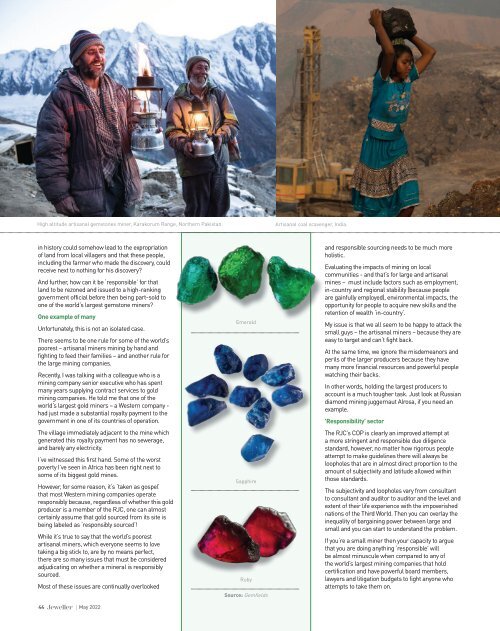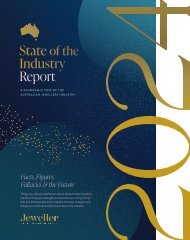Jeweller - May 2022
A new era: The pearl industry has been strengthened by adversity Responsibly sourced: Retailers want to provide it, but what does it really mean? Crystal ball: In order to predict trends, we learn from the past
A new era: The pearl industry has been strengthened by adversity
Responsibly sourced: Retailers want to provide it, but what does it really mean?
Crystal ball: In order to predict trends, we learn from the past
You also want an ePaper? Increase the reach of your titles
YUMPU automatically turns print PDFs into web optimized ePapers that Google loves.
High altitude artisanal gemstones miner, Karakorum Range, Northern Pakistan.<br />
Artisanal coal scavenger, India.<br />
in history could somehow lead to the expropriation<br />
of land from local villagers and that these people,<br />
including the farmer who made the discovery, could<br />
receive next to nothing for his discovery?<br />
And further, how can it be ‘responsible’ for that<br />
land to be rezoned and issued to a high-ranking<br />
government official before then being part-sold to<br />
one of the world’s largest gemstone miners?<br />
One example of many<br />
Unfortunately, this is not an isolated case.<br />
There seems to be one rule for some of the world’s<br />
poorest – artisanal miners mining by hand and<br />
fighting to feed their families – and another rule for<br />
the large mining companies.<br />
Recently, I was talking with a colleague who is a<br />
mining company senior executive who has spent<br />
many years supplying contract services to gold<br />
mining companies. He told me that one of the<br />
world’s largest gold miners – a Western company -<br />
had just made a substantial royalty payment to the<br />
government in one of its countries of operation.<br />
The village immediately adjacent to the mine which<br />
generated this royalty payment has no sewerage,<br />
and barely any electricity.<br />
I’ve witnessed this first hand. Some of the worst<br />
poverty I’ve seen in Africa has been right next to<br />
some of its biggest gold mines.<br />
However, for some reason, it’s ‘taken as gospel’<br />
that most Western mining companies operate<br />
responsibly because, regardless of whether this gold<br />
producer is a member of the RJC, one can almost<br />
certainly assume that gold sourced from its site is<br />
being labeled as ‘responsibly sourced’!<br />
While it’s true to say that the world’s poorest<br />
artisanal miners, which everyone seems to love<br />
taking a big stick to, are by no means perfect,<br />
there are so many issues that must be considered<br />
adjudicating on whether a mineral is responsibly<br />
sourced.<br />
Most of these issues are continually overlooked<br />
44 | <strong>May</strong> <strong>2022</strong><br />
Emerald<br />
Sapphire<br />
Ruby<br />
Source: Gemfields<br />
and responsible sourcing needs to be much more<br />
holistic.<br />
Evaluating the impacts of mining on local<br />
communities - and that’s for large and artisanal<br />
mines – must include factors such as employment,<br />
in-country and regional stability (because people<br />
are gainfully employed), environmental impacts, the<br />
opportunity for people to acquire new skills and the<br />
retention of wealth ‘in-country’.<br />
My issue is that we all seem to be happy to attack the<br />
small guys – the artisanal miners – because they are<br />
easy to target and can’t fight back.<br />
At the same time, we ignore the misdemeanors and<br />
perils of the larger producers because they have<br />
many more financial resources and powerful people<br />
watching their backs.<br />
In other words, holding the largest producers to<br />
account is a much tougher task. Just look at Russian<br />
diamond mining juggernaut Alrosa, if you need an<br />
example.<br />
'Responsibility’ sector<br />
The RJC’s COP is clearly an improved attempt at<br />
a more stringent and responsible due diligence<br />
standard, however, no matter how rigorous people<br />
attempt to make guidelines there will always be<br />
loopholes that are in almost direct proportion to the<br />
amount of subjectivity and latitude allowed within<br />
those standards.<br />
The subjectivity and loopholes vary from consultant<br />
to consultant and auditor to auditor and the level and<br />
extent of their life experience with the impoverished<br />
nations of the Third World. Then you can overlay the<br />
inequality of bargaining power between large and<br />
small and you can start to understand the problem.<br />
If you’re a small miner then your capacity to argue<br />
that you are doing anything ‘responsible’ will<br />
be almost minuscule when compared to any of<br />
the world’s largest mining companies that hold<br />
certification and have powerful board members,<br />
lawyers and litigation budgets to fight anyone who<br />
attempts to take them on.


















